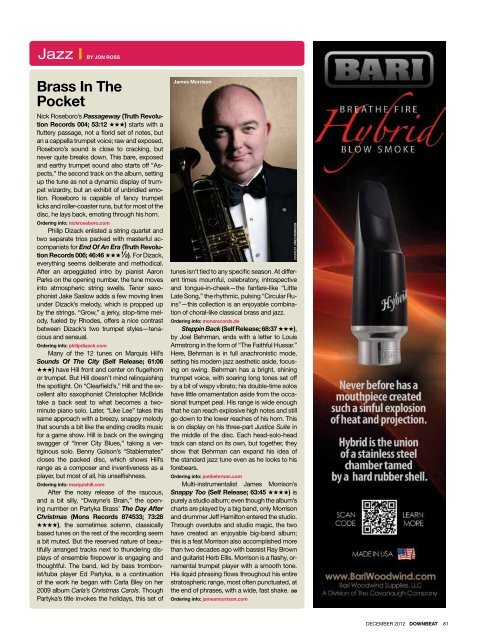Ron Carter Esperanza Spalding - Downbeat
Ron Carter Esperanza Spalding - Downbeat
Ron Carter Esperanza Spalding - Downbeat
Create successful ePaper yourself
Turn your PDF publications into a flip-book with our unique Google optimized e-Paper software.
Jazz | By Jon Ross<br />
Brass In The<br />
Pocket<br />
Nick Roseboro’s Passageway (Truth Revolution<br />
Records 004; 53:12 HHH) starts with a<br />
fluttery passage, not a florid set of notes, but<br />
an a cappella trumpet voice; raw and exposed,<br />
Roseboro’s sound is close to cracking, but<br />
never quite breaks down. This bare, exposed<br />
and earthy trumpet sound also starts off “Aspects,”<br />
the second track on the album, setting<br />
up the tune as not a dynamic display of trumpet<br />
wizardry, but an exhibit of unbridled emotion.<br />
Roseboro is capable of fancy trumpet<br />
licks and roller-coaster runs, but for most of the<br />
disc, he lays back, emoting through his horn.<br />
Ordering info: nickroseboro.com<br />
Philip Dizack enlisted a string quartet and<br />
two separate trios packed with masterful accompanists<br />
for End Of An Era (Truth Revolution<br />
Records 006; 46:46 HHH1/2). For Dizack,<br />
everything seems deliberate and methodical.<br />
After an arpeggiated intro by pianist Aaron<br />
Parks on the opening number, the tune moves<br />
into atmospheric string swells. Tenor saxophonist<br />
Jake Saslow adds a few moving lines<br />
under Dizack’s melody, which is propped up<br />
by the strings. “Grow,” a jerky, stop-time melody,<br />
fueled by Rhodes, offers a nice contrast<br />
between Dizack’s two trumpet styles—tenacious<br />
and sensual.<br />
Ordering info: philipdizack.com<br />
Many of the 12 tunes on Marquis Hill’s<br />
Sounds Of The City (Self Release; 61:06<br />
HHH) have Hill front and center on flugelhorn<br />
or trumpet. But Hill doesn’t mind relinquishing<br />
the spotlight. On “Clearfield’s,” Hill and the excellent<br />
alto saxophonist Christopher McBride<br />
take a back seat to what becomes a twominute<br />
piano solo. Later, “Like Lee” takes this<br />
same approach with a breezy, snappy melody<br />
that sounds a bit like the ending credits music<br />
for a game show. Hill is back on the swinging<br />
swagger of “Inner City Blues,” taking a vertiginous<br />
solo. Benny Golson’s “Stablemates”<br />
closes the packed disc, which shows Hill’s<br />
range as a composer and inventiveness as a<br />
player, but most of all, his unselfishness.<br />
Ordering info: marquishill.com<br />
After the noisy release of the raucous,<br />
and a bit silly, “Dwayne’s Brain,” the opening<br />
number on Partyka Brass’ The Day After<br />
Christmas (Mons Records 874533; 73:28<br />
HHHH), the sometimes solemn, classically<br />
based tunes on the rest of the recording seem<br />
a bit muted. But the reserved nature of beautifully<br />
arranged tracks next to thundering displays<br />
of ensemble firepower is engaging and<br />
thoughtful. The band, led by bass trombonist/tuba<br />
player Ed Partyka, is a continuation<br />
of the work he began with Carla Bley on her<br />
2009 album Carla’s Christmas Carols. Though<br />
Partyka’s title invokes the holidays, this set of<br />
James Morrison<br />
tunes isn’t tied to any specific season. At different<br />
times mournful, celebratory, introspective<br />
and tongue-in-cheek—the fanfare-like “Little<br />
Late Song,” the rhythmic, pulsing “Circular Ruins”—this<br />
collection is an enjoyable combination<br />
of choral-like classical brass and jazz.<br />
Ordering info: monsrecords.de<br />
Steppin Back (Self Release; 68:37 HHH),<br />
by Joel Behrman, ends with a letter to Louis<br />
Armstrong in the form of “The Faithful Hussar.”<br />
Here, Behrman is in full anachronistic mode,<br />
setting his modern jazz aesthetic aside, focusing<br />
on swing. Behrman has a bright, shining<br />
trumpet voice, with soaring long tones set off<br />
by a bit of wispy vibrato; his double-time solos<br />
have little ornamentation aside from the occasional<br />
trumpet peal. His range is wide enough<br />
that he can reach explosive high notes and still<br />
go down to the lower reaches of his horn. This<br />
is on display on his three-part Justice Suite in<br />
the middle of the disc. Each head-solo-head<br />
track can stand on its own, but together, they<br />
show that Behrman can expand his idea of<br />
the standard jazz tune even as he looks to his<br />
forebears.<br />
Ordering info: joelbehrman.com<br />
Multi-instrumentalist James Morrison’s<br />
Snappy Too (Self Release; 63:45 HHHH) is<br />
purely a studio album; even though the album’s<br />
charts are played by a big band, only Morrison<br />
and drummer Jeff Hamilton entered the studio.<br />
Through overdubs and studio magic, the two<br />
have created an enjoyable big-band album;<br />
this is a feat Morrison also accomplished more<br />
than two decades ago with bassist Ray Brown<br />
and guitarist Herb Ellis. Morrison is a flashy, ornamental<br />
trumpet player with a smooth tone.<br />
His liquid phrasing flows throughout his entire<br />
stratospheric range, most often punctuated, at<br />
the end of phrases, with a wide, fast shake. DB<br />
Ordering info: jamesmorrison.com<br />
Courtesy james Morrison<br />
DECEMBER 2012 DOWNBEAT 81
















